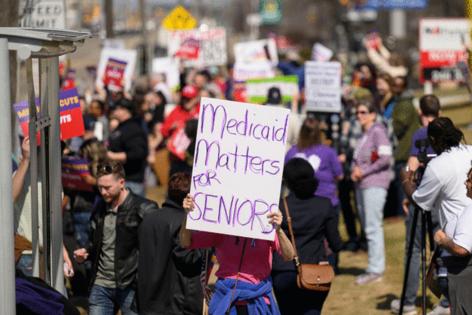Commentary: Only the united poor can save Medicaid
Published in Op Eds
The Trump administration’s recent moves to cut federal funding for Medicaid are nothing new. The cuts proposed in the budget resolution resemble similar Republican proposals such as the 2017 Better Care Reconciliation Act, which failed to pass the Senate due to both disunity among Republicans and a swell of organized opposition against it.
But bipartisan attacks on Medicaid are still a threat. Between April 2023 and October 2024, more than 25 million people were kicked off of Medicaid in what has become known as the Great Medicaid Purge. Nearly 70% of expulsions from Medicaid under former President Joe Biden were for administrative reasons such as paperwork mixups, which can often occur when people on Medicaid go through the annual process of proving that they are poor enough to be eligible for the service.
The Nonviolent Medicaid Army, of which I am a member, is a human rights organization made of everyday people fighting for our right to health care. We share the stories of people who are on Medicaid, or who have been unfairly excluded, on our Instagram page. We also spread awareness that people who are kicked off of Medicaid in any state can appeal the decision.
Through this effort, we’ve helped people keep their Medicaid and effectively oppose state apparatuses built to deny our basic rights. We are taking on the hard work prescribed by the Rev. Martin Luther King Jr. in his reflections on the Civil Rights Movement: “Yet in candor and self-criticism it is necessary to acknowledge that the torturous job of organizing solidly and simultaneously in thousands of places was not a feature of our work.” That “torturous job” is exactly the task to which we are committed.
As we do this work, we must also counter the many myths and false narratives about Medicaid which keep us disorganized and disunited, such as claims that Medicaid fraud is rampant. The reality is that the vast majority of Medicaid fraud is committed not by enrollees, but by corporations who systematically overcharge Medicaid programs.
Among those challenging the wisdom of broad cuts to Medicaid is former Trump adviser Steve Bannon — not because he cares about working-class people, but because he thinks it will lead to defections from their base. “Medicaid, you gotta be careful,” Bannon recently said on his podcast. “Because a lot of MAGAs are on Medicaid, I’m telling you. If you don’t think so, you are dead wrong.”
According to the American Hospital Association, “Medicaid provides health care to many of our most vulnerable populations, including pregnant women, children, the elderly, disabled and many of our working class.”
Politicians and health care profiteers of all stripes have a variety of reasons to protest Medicaid cuts. But they do not share the motivation or clarity of the organized poor fighting for the right to live.
John Wessel-McCoy, a member of the Indiana Nonviolent Medicaid Army and Richmond’s Housing and Human Rights Coalition, was in attendance at a public legislative forum hosted by Indiana state Rep. Brad Barrett and Sen. Jeff Raatz, both backers of the recently passed bill aimed at decreasing Medicaid enrollment in the state. He asked them the following:
“I hear about the money, I hear about the finance. I don’t want waste, I don’t want fraud, I don’t want abuse. How are you going to show us that the waste that you’re talking about isn’t the human beings that happen to be poor!”
Change comes from below, not above, and those closest to the problem must be at the forefront of the solution. That’s why the leadership of the poor and dispossessed is the only way to change the conditions which treat our friends and families as “waste.”
We cannot be spectators to a budget reconciliation process on a trajectory to immiserate the vast majority. The 140 million poor people in this country are made up of about 70 million people on Medicaid and tens of millions who are unfairly excluded.
In the face of ongoing and deepening attacks on Medicaid, we are coming together for support, survival and strategy. We’re uniting, across all lines of division, to take back what is being taken away.
____
Karim Sariahmed of Boston is a physician, researcher and co-coordinator of the Nonviolent Medicaid Army in Massachusetts. This column was produced for Progressive Perspectives, a project of The Progressive magazine, and distributed by Tribune News Service.
_____
©2025 Tribune Content Agency, LLC.




























































Comments